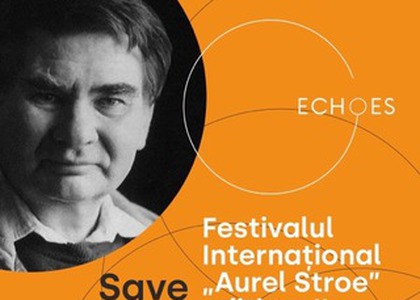> Interviews

Interview wth Maria Clara Brumariu, about the “Aurel Stroe” Festivalul, 2nd edition
Between May 5th and May 7th, 2025, the 2nd edition of the International Festival "Aurel Stroe" will take place, an event dedicated to the cultural and musical legacy of composer and teacher Aurel Stroe. More details we learn from Maria Clara Brumariu, his niece and initiator of the festival, in an interview with Ioana Țintea.
Last year you initiated the Aurel Stroe International Festival - an event dedicated to contemporary music and the memory of your grandfather, composer and teacher Aurel Stroe. How did this project come about and what were the echoes of the first edition?
That's right! Last year, I initiated this project in memory of my grandfather. It was a dream that I managed to realize after about 10 years. Having worked a lot in this field with RăzvanPopovici from the SoNoRo Festival, I realized that it's basically a calling of mine to carry these echoes of my grandfather further through a festival. And that's how the "Aurel Stroe" International Festival project was born.
As for last year's echoes, they were very good. The three concerts were in three different cities - in Bușteni, at the Aurel Stroe Cultural Center, in Ploiești, at the Art Museum and at the Great Hall of the Romanian Cultural Institute in Bucharest - and all the halls were full. We had many young people in the halls, which made me very happy, but also, of course, connoisseurs of my grandfather's music.
It is with great joy that I say that I would like to repeat this again this year and to have perhaps even more young people in the hall, especially since all three concerts this year are in Bucharest (this is the difference compared to last year's edition) and we have many more musicians involved in this project.
What does this year's program look like?
We start on Monday, May 5th, at 19.00 at the French Institute of Romania, Cinema Elvire Popesco, with a special concert. The first part will feature works by my grandfather, Aurel Stroe, Bernard Cavanna and Mihnea Brumariu - my father. And in the second part of the concert we will broadcast a documentary about my grandfather, a documentary made by Bernard Cavanna.
On Tuesday, May 6th, also at 7 p.m., we will see you at the Romanian Cultural Institute, where songs dedicated to grandfather and dedicated to the festival will be played. We have kept this idea of having a concert during the festival, where we will play a premiere of pieces written especially for the festival and dedicated to my grandfather. And there will be pieces by Bernard Cavanna, Irina Hasnaș, Sabina Ulubeanu and, of course, a piece by my grandfather.
And on May 7th, also at 19.00, we'll see you at the National University of Music in Bucharest, in the Auditorium Hall, where there will be two works by grandfather Aurel and a piece by Maurice Ravel.
For young musicians who did not have the opportunity to meet your grandfather, how would you describe him? What relevance do you think Aurel Stroe's work has for today's young audience?
I think it's very important to listen carefully, because grandfather's works need to be thought a little bit, not just listened to, and I think that every sound brings an additional feeling. There are many young musicians in Romania who are playing Aurel Stroe's works for the first time, musicians involved in this project, and I have even talked quite a lot with them. It was a challenge and it is still a challenge because they study very seriously for each individual work. But that's exactly what they told me, these are works that we think about, not just study.
Last year, in an interview with our station, you mentioned that you would like to resume the summer courses that your grandfather used to organize every year in Bușteni. Will the educational component become a priority for future editions of the festival?
For the future editions, yes, of course, we have this in our plans. It very much depends on the funding we will manage to get in the near future. But yes, the summer courses in Bușteni that my grandfather used to give, I would like them to become as important as this festival, which I would like to turn into a cultural platform. I mean the festival, the summer courses and possibly also tours abroad to places where grandpa taught or lived.
Translated by Andrei Mădălin Catană,
University of Bucharest, Faculty of Foreign Languages and Literatures, MTTLC, year II
Corrected by Silvia Petrescu














